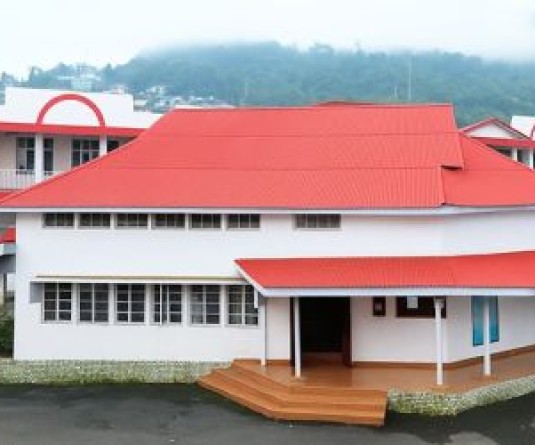
Regional conclave on ‘Natural Resources, Skill Manpower and Development of Northeast’ at Kohima Science College held
Morung Express News
Kohima | April 30
There are 345 species of orchids in Nagaland, many are rare and found only in the State, informed Prof. Sapu Changkija of Department of Genetics and Plant Breeding, SASRD, Medziphema today.
The state has one of the richest species of germplasm biodiversity, he added.
Prof. Changkija provided these data at a regional seminar on ‘Natural Resources, Skill Manpower and Development of Northeast” organised here by Kohima Science College, Jotsoma on April 30. He was dwelling on the natural resources of NE with special focus on Nagaland.
Other resource persons at the seminar were Neichute Doulo, CEO and Coordinator, Entrepreneurs Associate, and Amba Jamir, Founder & Executive, Sustainable Development Forum, Nagaland. Dr. Anungla Aier, Addl. Director, Higher Education gave the keynote speech while Nagaland Governor P.B Acharya delivered the valedictory address.
Further elucidating, Prof. Changkija maintained that the State is also a centre of origin of many rice varieties as well as other crops and plants.
Listing out ten hotspots in Nagaland, he informed that a total of 231 crops are cultivated in Nagaland with 105 crops under Jhum cultivation.
There are 248 edible fruits, 128 wild vegetables, and more than 686 medicinal plants as well as 280 species of ferns, the Professor listed.
“Nagaland is very rich in bamboo species where any bamboo variety introduced grows well due to the soil,” he maintained.
The State also has 8 agricultural resource system namely shifting cultivation, alder-based shifting cultivation, wet terrace paddy cultivation, Apatani system of water management, bamboo drip irrigation, Zabo farming system, home and kitchen gardening and Agroforestry.
While noting that the State has the richest fauna in NE, Prof. Changkija regretted that the biodiversity “is being impoverished disastrously along with the overall degradation in the last few decades.”
Eight skills for Nagas
“Skills must generate income and wealth. It must be easily teachable and acquirable. Skill development needs to evolve with the needs of the market and emerging gaps in skilled human resources,” said Neichute Doulo who stressed on eight skills that Nagas can earn as their livelihood.
These are farm based skill livelihood such as rearing of chicken, ducks, quail, pigs and mithun; farm based skill such as horticulture; English teaching skills; skill development in construction; self-employment and entrepreneurship; folksong teachers and story tellers; housekeeping for homes; and driving skills.
“These are new skills that our youngsters need to acquire. These are highly doable. Students must begin to think beyond government jobs. Your opportunities are far more beyond government jobs,” stressed Doulo.
Equitable Economic growth
Speaking on the development of NE region with special reference to Nagaland, Amba Jamir mentioned that equity, representation and participation are issues that must be challenged while talking about development.
“Economic growth if not spread equitably can be dangerous,” he opined.
Focusing on the indispensability of the youth, Jamir pointed out that the “youth are the power banks of the nation and not just vote banks.”
Development must include policies that are evidence based and participatory, aligning with sustainability goals and trends, and focus on learning and skilling against mere education, he stated.
Skill & diligence of the people
With every country across the world striving for economic growth and development, Dr. Anungla Aier, Addl. Director, Higher Education in her keynote speech noted that the socio-economic development of a country is linked to the skill and diligence of the people in general and in particular the working people of a country.
Dr. Aier, thus, advocated that education sector need to “rethink the system and the Government must take cognizance of the crucial role it plays in generating skill manpower which is the need of the hour.”
“We talk about sustainable development but without skill manpower and adequate training of human resources it becomes only rhetoric.”
For this, the Addl. Director expressed that the State must take up the challenge of creating effective convergence between the education system and the government skill development efforts, creation of the necessary institutional mechanism and mobilization of adequate investments for financing skilled manpower generation.
Governor P.B Acharya in his speech also emphasised on skill development in the education system.
“Youth are in demand across the globe but the knowledge acquired should be applicable to the demands. Universities and educational institutions should take the responsibility to make student, when they pass out, job givers and not job seekers,”






